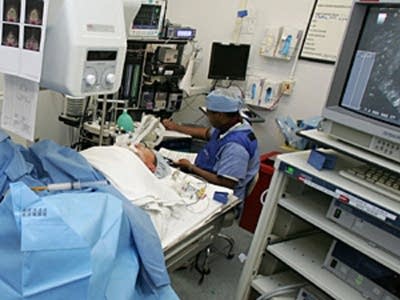Report: Medical errors linked to 12 deaths in 12 months in Minnesota
Go Deeper.
Create an account or log in to save stories.
Like this?
Thanks for liking this story! We have added it to a list of your favorite stories.

The 106 reported medical mistakes include 16 instances in which the wrong body part was operated on, two instances in which the wrong patient was operated on and eight instances in which the wrong procedure was performed.
Bruce Rueben with the Minnesota Hospital Association says any medical mistake is a problem. But he says 106 medical errors over a one-year time period represent a small fraction of the patient visits in Minnesota.

"Think about what the numbers are! One-hundreds-six adverse events. I mentioned that the hospitals had six million visits this past year and that doesn't include the ambulatory surgery centers and the activity there. I think people should take great comfort in the results of the report this year," Rueben said.
This is the second annual report listing medical mistakes made in Minnesota. It's hard to compare last year's report and this year's, because the earlier report was based on a survey of fewer facilities and covered a longer study period.
Turn Up Your Support
MPR News helps you turn down the noise and build shared understanding. Turn up your support for this public resource and keep trusted journalism accessible to all.
The most common errors listed in the latest report were serious bed sores and completing surgeries without removing all of the tools.
St. Mary's Hospital in Rochester reported the most medical errors with 18, but it also had a higher number of patient visits than many of the other hospitals.
Minnesota Health Commissioner Dianne Mandernach said patients should not judge a hospital's quality because of the errors in the report. She said hospital officials are expected to use the listed problems to fix their mistakes.
"It would be incomplete for us to focus only on the numbers but on the underlying evaluation of the cause of the error and the actions that should be taken to prevent them from ever being taken again," she said.
Mandernach said about one in four surgical mistakes occurred outside of the standard operating room. She also says an analysis has shown that some of the mistakes were also caused when a body part was not clearly marked, or when hurried staff didn't follow proper procedures.
Holly Rodin, who works with the Service Employees International Union, which has many members working in Minnesota hospitals, says some of the mistakes could be reduced if the hospitals invested more in staff and technology.
"I would venture to guess if someone was to look at all of the details of exactly why these events happened, a lot of them would be related to staffing supplies and equipment," she said.
Others say the number of medical mistakes should be lower, since the medical community has focused on the problem for years.
"We have been talking about and working on these issue for at least six years, if not longer and we just haven't seen a lot of progress," said Carolyn Pare, the executive director of the Buyers' Health Care Action Group.
The group is a coalition of private and public businesses that hope to use bulk purchasing to improve medical care and drive down health care costs. Pare is disappointed with the reports results since hospitals, HMOs and others have put a lot of time and energy into reducing the number of serious medical errors in Minnesota.
Pare says some errors like wrong-site surgeries and operating on the wrong patient are inexcusable.
"They should never happen, and I think talking about adverse events and numbers -- remember that there's a person behind every single one of these events. I think these events are tragic and I would like to see them go down," Pare said.
Pare also believes consumers should base their hospital choices on some of the information in the report. She says changes in consumer behavior will force hospitals to improve quality.
But Mark Banks, CEO of Blue Cross and Blue Shield of Minnesota, says he doesn't think consumers should make their decisions on the medical errors listed in the latest report.
"Because they're so rare and infrequent, it's not something you can use as a scorecard to judge the relative quality of one organization against another," says Banks.
Banks says consumers should be ready to ask questions whenever they visit a hospital or outpatient surgery. He says they should also be ready to ask questions if they are unsure or unhappy with how a hospital staff member is performing.
Dear reader,
Political debates with family or friends can get heated. But what if there was a way to handle them better?
You can learn how to have civil political conversations with our new e-book!
Download our free e-book, Talking Sense: Have Hard Political Conversations, Better, and learn how to talk without the tension.




